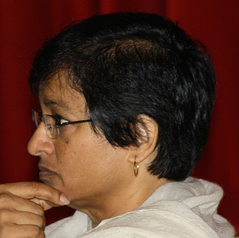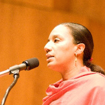 Susan Z. Andrade is associate professor of English at the University of Pittsburgh and is affiliated with the French and Italian department as well as with the programs in African Studies, Asian Studies, Cultural Studies, and Women’s Studies.
Susan Z. Andrade is associate professor of English at the University of Pittsburgh and is affiliated with the French and Italian department as well as with the programs in African Studies, Asian Studies, Cultural Studies, and Women’s Studies.
 Susan Z. Andrade is associate professor of English at the University of Pittsburgh and is affiliated with the French and Italian department as well as with the programs in African Studies, Asian Studies, Cultural Studies, and Women’s Studies.
Susan Z. Andrade is associate professor of English at the University of Pittsburgh and is affiliated with the French and Italian department as well as with the programs in African Studies, Asian Studies, Cultural Studies, and Women’s Studies.
Le Ventre de l’Afrique: A New Tendency in African Fiction
Le Ventre de l’Afrique (2005), by Senegal-born Fatou Diome, stands for a new tendency in African fiction: storytelling about the migrant worker and Africans as part of an economy of global labor. African writers have always moved about, studied and lived away from their places of birth, even while the subjects of their fiction involved topics close to home: disillusionment with the newly independent nation, cultural ambivalence, a critique of sex/gender politics. How does this most recent literary movement differ from the writing of earlier African writers? What, if any, relation does this Francophone fiction bear to that of Anglophone authors such as Chimananda Adichie, Chris Abani, Noviolet Bulawayo, and others who have immigrated to the U.S. and U.K? Are future directions in African fiction in English and French fundamentally different?
 Jerome Branche is Professor of Latin American Literature and Cultural Studies in the Department of Hispanic Languages and Literatures, University of Pittsburgh. His teaching and research interest is in racialized modernity and the way creative writers imagine and articulate slavery, freedom, the nation, being, and gender. His work to date includes Colonialism and Race in Luso-Hispanic Literature (Missouri 2006), and The Poetics and Politics of Diaspora: Transatlantic Musings (Routledge 2014). He is also the editor, most recently, of Black Writing, Culture and the State in Latin America (Vanderbilt 2015), and of other collections. His current book project studies freedom narratives from the Caribbean, Latin America and Africa, before and after the attainment of Independence.
Jerome Branche is Professor of Latin American Literature and Cultural Studies in the Department of Hispanic Languages and Literatures, University of Pittsburgh. His teaching and research interest is in racialized modernity and the way creative writers imagine and articulate slavery, freedom, the nation, being, and gender. His work to date includes Colonialism and Race in Luso-Hispanic Literature (Missouri 2006), and The Poetics and Politics of Diaspora: Transatlantic Musings (Routledge 2014). He is also the editor, most recently, of Black Writing, Culture and the State in Latin America (Vanderbilt 2015), and of other collections. His current book project studies freedom narratives from the Caribbean, Latin America and Africa, before and after the attainment of Independence.
 Myriam J. A. Chancy is a Guggenheim Fellow and the HBA Chair of the Humanities at Scripps College. Her academic publications include: From Sugar to Revolution: Women’s Visions from Haiti, Cuba & The Dominican Republic (WUP 2012), Framing Silence: Revolutionary Novels by Haitian Women (Rutgers 1997), and Searching for Safe Spaces: Afro-Caribbean Women Writers in Exile (Temple 1997; Choice OAB Award, 1998). Her novels include: The Loneliness of Angels (Peepal Tree 2010; 2011 Guyana Prize in Literature Caribbean Award, Best Fiction 2010), and Spirit of Haiti (Mango 2003; shortlisted, Best First Book Category, Canada/Caribbean region, Commonwealth Prize 2004). A recent editorial advisory board member of PMLA (2010-12) and of the Fetzer Institute (2011-13), she currently sits on the editorial board of the Journal of Haitian Studies (UC, Santa Barbara), and the advisory board of Voices For Our America (VOA) housed at Vanderbilt University.
Myriam J. A. Chancy is a Guggenheim Fellow and the HBA Chair of the Humanities at Scripps College. Her academic publications include: From Sugar to Revolution: Women’s Visions from Haiti, Cuba & The Dominican Republic (WUP 2012), Framing Silence: Revolutionary Novels by Haitian Women (Rutgers 1997), and Searching for Safe Spaces: Afro-Caribbean Women Writers in Exile (Temple 1997; Choice OAB Award, 1998). Her novels include: The Loneliness of Angels (Peepal Tree 2010; 2011 Guyana Prize in Literature Caribbean Award, Best Fiction 2010), and Spirit of Haiti (Mango 2003; shortlisted, Best First Book Category, Canada/Caribbean region, Commonwealth Prize 2004). A recent editorial advisory board member of PMLA (2010-12) and of the Fetzer Institute (2011-13), she currently sits on the editorial board of the Journal of Haitian Studies (UC, Santa Barbara), and the advisory board of Voices For Our America (VOA) housed at Vanderbilt University.
Autochthonomies: A New Model of Indigeneity for Understanding African Diasporic Subjectivity
My neologism, “autochthonomies” serves to describe a practice of subjectivity and agency employed by African diasporic artists through literary and visual texts. I assert that such artists practice anchoring their works in mobile, indigenous African cultures and those of their diasporas, while also assuming the universal practice of seeking freedom in the constitution of personhood. Most recent studies dealing with subjects of African descent seek inclusivity in the discourse of dominant narratives (see Wright, Edwards, Gilroy, Hartman, Appiah, among others). I would contend that such protracted efforts only serve to continue to position people of African descent as marginal, even when their works are produced out of national identifications and locales where African or African-descended people, and their culture(s), form a majority. Such studies also fail to take into consideration that a transnational African diasporic culture and identity has emerged over several centuries. The continuing intellectual labor of demonstrating, or “proving,” the humanity of people of African descent is not only wasted energy, it also distracts us away from reading practices and theories that could make sense of the work of artists of African descent who choose not to be confined by what Jan Mohammed has accurately described as the “Manichean dialectics of colonialism.” What epistemes are being obscured by conceding, even via refutation, to the philosophical paradigms that insist on the inferiority vs. superiority of “races” (Hegel), and that divide human beings arbitrarily into a hierarchical schema (Linnaeus, Cuvier, Gobineau, etc.) at the service of hegemonic societal structures? Rather than mount yet another counter-argument against racial constructions, I suggest, as have more recent philosophers and cultural critics concerned with social equity and the legacy of continental thought (see Eze, Mignolo), that we revise what we understand by terms such as “reason” and “difference,” while also framing the production of African diasporic transnational cultural workers on their own terms. As such, the concept of autochthonomies” intends to provide a productive intervention in race, Caribbean, African diasporic, and cultural studies by providing a radically new model for a culturally imbedded reading practice of contemporary works by African and African diasporic artists: its purpose is to reveal the contributions to ontology that such artists deploy by re-considering the use of terms like “indigeneity” relative only to First Nations people, via post-colonial (African) paradigms (as does James Clifford in recent work), and by anchoring this re-appraisal and redefinition of indigeneity in African diasporas.

Baltasar Fra-Molinero is professor of Spanish, Latin American Studies and African American Studies at Bates College in the USA. He is the author of La imagen del negro en el teatro del Siglo de Oro [The Image of Blacks in Spanish Classical Theater](Madrid, Siglo XXI, 1995) and several other essays related to the African Diaspora in the former territories of the Spanish empire. He has edited two volumes addressing the issue of race in early modernity in the works of Cervantes (Annals of Scholarship 2010) and co-edited with Benita Sampedro a monographic issue on Equatorial Guinea for Afro-Hispanic Review (fall of 2009). He has published with Benita Sampedro Ceiba II: Poesía inédita (Madrid: Editorial Verbum, 2014), by Equatorial Guinean writer Raquel Ilombe del Pozo Epita. He is currently working on the figure of the Afro-Hispanic Latin poet Juan Latino (c. 1518-c. 1590).
Black Atlantic Identities and the Spanish Inquisition
The Canary Islands played a pivotal role in the development of the African diaspora. The astonishing number of Black men and women processed by the Spanish Inquisition of the Canary Islands covers almost the entire history of this religious institution, the first in a European empire that had a global reach. Through the written records of hundreds of cases, the bureaucratically mediated voices of Black men and women, free and enslaved, speak about their travels, their religious beliefs, their medical practices, their family ties, and their relationship with the institution of slavery. These men and women came from western Africa but also from Boston or Barbados. A formerly enslaved Black man is accused of believing that Christ suffered from temptations of the flesh. An enslaved Black woman publically affirms that she would rather be a Muslim and free in her own land than an enslaved captive in a Christian land. Black women defend themselves against accusations of sorcery and witchcraft by describing in exact terms what they consider harmless medical practices. Enslaved Black men and women born in the English seafaring empire voluntarily approach the Holy Office to declare their wish to become Catholic, even if they do not speak Spanish. These men and women share a clear notion of their transnational subjectivity, their blackness being the vortex of a “thirdspace” in the postcolonial conceptualization of Edward Soja, but here applied to a time, a geographic space and the peculiar political condition of an insular reality in the middle of the Atlantic, neither a full colony nor an integral part of the white/Spanish metropolis.
 Carmen Fracchia, Senior Lecturer of Early Modern Spanish Visual Studies in the Department of Cultures and Languages, Birkbeck University of London, UK. Her research interest is in early modern Spanish notions of human diversity, religion, slavery and ethnic prejudice, and the ways visual artists articulate subjectivity, slavery, freedom and hybridity. Her work has received considerable international recognition through papers given in international conferences and publications in journals and edited collections in Spain, Holland, the UK, the USA, Argentina, and, Chile. Fracchia has been a researcher in three international projects on different aspects of Slavery and Abolitionism in Spain at the University of Granada, Spain (2008-2013), all sponsored by the Spanish government. Her current book project 'Black but Human': Slavery and Art in Imperial Spain, 1480-1800 explores the emergence of the slave and freed slave subjects in the visual form of Imperial Spain. She explores the links between visual regimes and early modern Spanish discourses on slavery and human diversity.
Carmen Fracchia, Senior Lecturer of Early Modern Spanish Visual Studies in the Department of Cultures and Languages, Birkbeck University of London, UK. Her research interest is in early modern Spanish notions of human diversity, religion, slavery and ethnic prejudice, and the ways visual artists articulate subjectivity, slavery, freedom and hybridity. Her work has received considerable international recognition through papers given in international conferences and publications in journals and edited collections in Spain, Holland, the UK, the USA, Argentina, and, Chile. Fracchia has been a researcher in three international projects on different aspects of Slavery and Abolitionism in Spain at the University of Granada, Spain (2008-2013), all sponsored by the Spanish government. Her current book project 'Black but Human': Slavery and Art in Imperial Spain, 1480-1800 explores the emergence of the slave and freed slave subjects in the visual form of Imperial Spain. She explores the links between visual regimes and early modern Spanish discourses on slavery and human diversity.
Picturing the Afro-Hispanic struggle for freedom in early modern Spain
My paper will concentrate on the shift from slavery to freedom and the ways in which enslaved and freed Afro-Hispanics tried to forge their collective identity in early modern Spain. The whitening of their souls, the ideological association of the word ‘black’ and ‘slave’, and the stigma of slavery as permanently inscribed on the slave’s skin made the lives of freedwomen and men extremely difficult in the crowns of Castile and Aragon.
My work will argue that the marginalization and the invisibilization of Afro-Hispanics (even in the Spanish visual form) did not completely prevent the contribution made by Afro-Hispanics in the visual field, as documentary material shows. I will focus on the emergence of the ‘ex-enslaved Afro-Hispanic subject’ by exploring the case of the painter Juan de Pareja (c. 1606-1670) as a producer of visual culture at the centre of the Spanish Empire. Here and for the first time, I will explore Pareja’s career as an independent visual artist. I will show that his attachment to Africa and his connexion to New Spain has its roots in the painful and ambivalent experiences of Afro-Hispanic slaves and in their collective identity developed in the first ever black confraternity (conceived as “our black nation”), founded at the end of the fourteenth century in Seville.
 Cary Fraser is a scholar of international relations in the 19th and 20th centuries and his publications have spanned the history and politics of the Cold War, religion and the international politics of the Middle East, race and politics in the Americas, and the history and politics of decolonization in global context. He has published his work in Canada, the Caribbean, the United Kingdom and the United States. His career and his publications reflect a career that has spanned encompassed both academic and non-academic paths - a reflection of the breadth of his interests. He served as the President of the University of Belize in Central America over the period 2011-2014 and has returned to the US where he has joined the faculty of the Department of Government and Justice Studies at Appalachian State University.
Cary Fraser is a scholar of international relations in the 19th and 20th centuries and his publications have spanned the history and politics of the Cold War, religion and the international politics of the Middle East, race and politics in the Americas, and the history and politics of decolonization in global context. He has published his work in Canada, the Caribbean, the United Kingdom and the United States. His career and his publications reflect a career that has spanned encompassed both academic and non-academic paths - a reflection of the breadth of his interests. He served as the President of the University of Belize in Central America over the period 2011-2014 and has returned to the US where he has joined the faculty of the Department of Government and Justice Studies at Appalachian State University.
Reconstituting Self, Reconstituting Society
"Lord, we ain’t what we want to be. We ain’t what we ought to be. We ain’t what we gonna be. But, thank God, we ain’t what we was." Martin Luther King, Jr. in London, 1964
This paper will explore the ways in which the issue of Freedom in the Black Atlantic in the 1950s and 1960s becomes the axis of collaboration in the search for alternative identities and social orders within the Atlantic World. The paper will address this topic by exploring the ways in which intellectuals grapple with the challenges of personal liberation and social/political transformation during that period.
Gendering Quilombismo: Slavery, Racial Democracy, and Black Genocide.
 Juliet Hooker is Associate Professor of Government and of African and African Diaspora Studies at the University of Texas at Austin. She is a political theorist specializing in comparative political theory and critical race theory. Her primary research interests include black political thought, Latin American political thought, political solidarity, and multiculturalism; she has also published on Afro-descendant and indigenous politics and multicultural rights in Latin America. She is the author of Race and the Politics of Solidarity (Oxford University Press, 2009), and is currently working on a book project comparing the ideas about race of prominent nineteenth and twentieth-century U.S. African-American and Latin American political thinkers, tentatively entitled Hybrid Traditions. Her articles have appeared in journals such as Politics, Groups and Identities, Souls, Journal of Latin American Studies, and Latin American Research Review. Professor Hooker served as Associate Director of the Teresa Lozano Long Institute of Latin American Studies (LLILAS) at UT-Austin from 2009-2014, and will be a Distinguished Visiting Fellow at the CUNY Graduate Center during Spring 2016.
Juliet Hooker is Associate Professor of Government and of African and African Diaspora Studies at the University of Texas at Austin. She is a political theorist specializing in comparative political theory and critical race theory. Her primary research interests include black political thought, Latin American political thought, political solidarity, and multiculturalism; she has also published on Afro-descendant and indigenous politics and multicultural rights in Latin America. She is the author of Race and the Politics of Solidarity (Oxford University Press, 2009), and is currently working on a book project comparing the ideas about race of prominent nineteenth and twentieth-century U.S. African-American and Latin American political thinkers, tentatively entitled Hybrid Traditions. Her articles have appeared in journals such as Politics, Groups and Identities, Souls, Journal of Latin American Studies, and Latin American Research Review. Professor Hooker served as Associate Director of the Teresa Lozano Long Institute of Latin American Studies (LLILAS) at UT-Austin from 2009-2014, and will be a Distinguished Visiting Fellow at the CUNY Graduate Center during Spring 2016.
This paper will analyze Abdias do Nascimento’s critique of Latin American ideologies of racial mixing as a political project of white supremacy and black genocide in light of the call by black feminists to approach the study of slavery and its afterlife from the perspective of gendered strategies of freedom that complicate our understandings of gendered power relations within slavery and beyond. It unpacks his notion of ‘Quilombismo’ or the political practices developed by fugitive slaves, and juxtaposes it to recent scholarship on the experiences of enslaved women in order to consider the limits of accounts of black freedom that may unwittingly reproduce certain civic vices (particularly in relation to racialized sexuality) bred by slavery.
 Tanya K. Hernandez is a Professor of Law at Fordham University School of Law, in New York City. Most recently, Professor Hernandez, was awarded a 2015 Fulbright Specialist Grant to be consult on racial equality projects at Université Paris Ouest Nanterre La Défense, in Paris and the University of the West Indies Law School, in Trinidad. She has previously served as a Law and Public Policy Affairs Fellow at Princeton University, and as an Independent Scholar in Residence at the Schomburg Center for Research in Black Culture. Professor Hernandez serves on the editorial boards of the Law and Social Inquiry Journal of the American Bar Foundation, the Revista Brasileira de Direito e Justiça/Brazilian Journal of Law and Justice, and the Latino Studies Journal published by Palgrave-Macmillian Press.
Her most recent book is "Racial Subordination in Latin America: The Role of the State, Customary Law and the New Civil Rights Response," (Cambridge Univ. Press) (http://www.cambridge.org/us/knowledge/isbn/item6865338/?site_locale=en_US), and its Spanish translation, "La subordinación racial en Latinoamérica: El papel del Estado, el derecho consuetudinario y la nueva respuesta de los derechos civiles" (Siglo del Hombre Editores, Ediciones Uniandes, Colección Nuevo Pensamiento Jurídico, Bogotá Colombia, 2013) (http://www.siglodelhombre.com/shop.asp).
Tanya K. Hernandez is a Professor of Law at Fordham University School of Law, in New York City. Most recently, Professor Hernandez, was awarded a 2015 Fulbright Specialist Grant to be consult on racial equality projects at Université Paris Ouest Nanterre La Défense, in Paris and the University of the West Indies Law School, in Trinidad. She has previously served as a Law and Public Policy Affairs Fellow at Princeton University, and as an Independent Scholar in Residence at the Schomburg Center for Research in Black Culture. Professor Hernandez serves on the editorial boards of the Law and Social Inquiry Journal of the American Bar Foundation, the Revista Brasileira de Direito e Justiça/Brazilian Journal of Law and Justice, and the Latino Studies Journal published by Palgrave-Macmillian Press.
Her most recent book is "Racial Subordination in Latin America: The Role of the State, Customary Law and the New Civil Rights Response," (Cambridge Univ. Press) (http://www.cambridge.org/us/knowledge/isbn/item6865338/?site_locale=en_US), and its Spanish translation, "La subordinación racial en Latinoamérica: El papel del Estado, el derecho consuetudinario y la nueva respuesta de los derechos civiles" (Siglo del Hombre Editores, Ediciones Uniandes, Colección Nuevo Pensamiento Jurídico, Bogotá Colombia, 2013) (http://www.siglodelhombre.com/shop.asp).
Anani Dzidzienyo: The Embodiment of African/African-diaspora Anti-colonial Activist Scholar
This paper will examine the scholarly activism of Anani Dzidzienyo, Brown University professor of Africana Studies, and of Portuguese and Brazilian Studies. It will unpack the importance of his scholarship for revealing the reality of racial discrimination in Brazil and Latin America, and his central role in prompting the continued production of knowledge critical to couterdiscursive consciousness raising in the region.
 R. A. Judy is Professor of Critical and Cultural Studies in the Department of English at the University of Pittsburgh, where he teaches course related to the fields of American literature and culture, African literature, Arab literature, contemporary Islamic thought, as well as world literature, and literary theory and criticism. He is a member of the Editorial Collective of boundary 2, an international journal of literature and culture. Having done undergraduate studies in Islamic studies and Arabic literature at al-Azhar University, Cairo Egypt, Professor Judy received his BA in Islamic philosophy and culture from the
University of Minnesota in 1982, and his PhD in Comparative Literature from the University of Minnesota in 1990. A Recipient of prestigious honors from the Ford and Mellon Foundations, he was a Fulbright Fellow at the Institut Bourguiba des Langues Vivantes, Université de Tunis I, in Tunis, Tunisia, and has traveled extensively in the Middle East and North Africa. Professor Judy is the author of (Dis)forming the American Canon: The Vernacular of African Arabic American Slave Narrative (1992), and has edited numerous special issues and dossiers for boundary 2, among which are: Tunisia Dossier (2012), Ralph Ellison: The Next Fifty Years (2003); Sociology Hesitant: W. E. B.Du Bois’s Dynamic Thinking (2001), Reasoning and the Logic of Things Global, (1999), and Scattered Speculations on Value: Exchange Between Etienne Balibar, Antonio Negri, and Gayatri Spivak (1999). Each of these issues have elaborated the work of critical theory and literary criticism across fields as diverse as Black studies, global English
studies, modern Arabic literary studies, and comparative literature. Professor Judy has also published numerous essays in the areas of philosophy, contemporary Islamic philosophy, literary/cultural theory, music, and Arabic and American literatures. Among these are: “Restless Tunisians” in La Tunisie du XXIe siècle: Quels pouvoirs pour quells modèles de société? (EuroOrient, 2012), “Dreaming About the Singularity of the New Middle Ages: Three Provisional Notes on the Question of Imagination” (Critical Zone 3, 2009); “Some Thoughts on Naguib Mahfouz in the Spirit of Secular Criticism” (boundary 2, 2007), “Sayyid Qutb’s fiqh al- waqi‘i, or New Realist Science” (boundary2, 2004), “The Threat to Islamic Humanity After 11 September 2001” (Critical Quarterly, 2003), “September 11 Uttorkal O Bipponno Islami Manobota” (Abobhash 3, 2003), “Islamiyya and the Construction of Human Being” in Trends in Islamic Thought (1998), “The New Black Aesthetic and W.E.B. Du Bois, or Hephaestus, Limping” (The
Massachusetts Review, 1994), “The Question of Nigga Authenticity” (boundary 2, 1994), and “Kant and the Negro,” (Surfaces, 1991). He is currently completing the manuscript for a book project under contract with Fordham University Press, entitled Thinking in Disorder: Essays of Poetic Socialities, as well as working on a subsequent book project tentatively called Fanon, the Last Negro and the New Man.
working on a subsequent book project tentatively called Fanon, the Last Negro and the New Man.
R. A. Judy is Professor of Critical and Cultural Studies in the Department of English at the University of Pittsburgh, where he teaches course related to the fields of American literature and culture, African literature, Arab literature, contemporary Islamic thought, as well as world literature, and literary theory and criticism. He is a member of the Editorial Collective of boundary 2, an international journal of literature and culture. Having done undergraduate studies in Islamic studies and Arabic literature at al-Azhar University, Cairo Egypt, Professor Judy received his BA in Islamic philosophy and culture from the
University of Minnesota in 1982, and his PhD in Comparative Literature from the University of Minnesota in 1990. A Recipient of prestigious honors from the Ford and Mellon Foundations, he was a Fulbright Fellow at the Institut Bourguiba des Langues Vivantes, Université de Tunis I, in Tunis, Tunisia, and has traveled extensively in the Middle East and North Africa. Professor Judy is the author of (Dis)forming the American Canon: The Vernacular of African Arabic American Slave Narrative (1992), and has edited numerous special issues and dossiers for boundary 2, among which are: Tunisia Dossier (2012), Ralph Ellison: The Next Fifty Years (2003); Sociology Hesitant: W. E. B.Du Bois’s Dynamic Thinking (2001), Reasoning and the Logic of Things Global, (1999), and Scattered Speculations on Value: Exchange Between Etienne Balibar, Antonio Negri, and Gayatri Spivak (1999). Each of these issues have elaborated the work of critical theory and literary criticism across fields as diverse as Black studies, global English
studies, modern Arabic literary studies, and comparative literature. Professor Judy has also published numerous essays in the areas of philosophy, contemporary Islamic philosophy, literary/cultural theory, music, and Arabic and American literatures. Among these are: “Restless Tunisians” in La Tunisie du XXIe siècle: Quels pouvoirs pour quells modèles de société? (EuroOrient, 2012), “Dreaming About the Singularity of the New Middle Ages: Three Provisional Notes on the Question of Imagination” (Critical Zone 3, 2009); “Some Thoughts on Naguib Mahfouz in the Spirit of Secular Criticism” (boundary 2, 2007), “Sayyid Qutb’s fiqh al- waqi‘i, or New Realist Science” (boundary2, 2004), “The Threat to Islamic Humanity After 11 September 2001” (Critical Quarterly, 2003), “September 11 Uttorkal O Bipponno Islami Manobota” (Abobhash 3, 2003), “Islamiyya and the Construction of Human Being” in Trends in Islamic Thought (1998), “The New Black Aesthetic and W.E.B. Du Bois, or Hephaestus, Limping” (The
Massachusetts Review, 1994), “The Question of Nigga Authenticity” (boundary 2, 1994), and “Kant and the Negro,” (Surfaces, 1991). He is currently completing the manuscript for a book project under contract with Fordham University Press, entitled Thinking in Disorder: Essays of Poetic Socialities, as well as working on a subsequent book project tentatively called Fanon, the Last Negro and the New Man.
working on a subsequent book project tentatively called Fanon, the Last Negro and the New Man.
“‘What Kind Freedom is this?’ From Haiti to Tunisia”
This talk makes three claims. First, the events that occurred in Tunisia in December 2010 and January 2011 are an instance of what Zygmnt Bauman has called an aesthetic sociality, manifested in the spontaneity of subjective feeling erupting into volatile and unpredictable occasions of consensus. As Bauman describes it, this “Instantaneous sociality” interrupts modernity’s cumulative institutionalized practices of disciplining normality, whose genealogies Foucault elaborated under the lose rubric of biopolitics. That interruption causes a defaillancy, a sort of system breakdown or momentary weakness of force, engendering a possibility for another kind of formation. Alain Badiou had something like this in mind when he described the events as “the Tunisian riots,” and postulated that we are now in a time of riots as an interval period in capitalism’s global development. Second, the events in Tunisia are “inherently illegible” according to the hermeneutics of revolution significantly dependent of Marx’s analysis of the Revolution of 1848 in his Eighteenth Brumaire of Louis Bonaparte. I argue that if instead of regarding them along those lines we consider them in relation to the Haitian Revolution, they will be more readily legible. My contention is that the Tunisian Revolution marks the emergence of what Tony Bogues, in his effort to think the centrality of artistic and poetic expression in the Haitian peoples’ effort to actualize a free revolutionary society, calls “common association.” In that vein, the Tunisian Revolution is an iteration of the long struggle by the damned of the earth, as Frantz Fanon characterized those enslaved and colonized under capitalism, to become and think something else; in the words of the deceased Tunisian revolutionary, Ahmed Jdey, the “indestructible dream of a better world.” The third claim is that among the gifts the ongoing Tunisian Revolution presents to the world is an occasion to revitalize the project of global liberation associated with the various movements of radical revolution in the mid-twentieth century.
 Madhu Krishnan is a lecturer in 20th and 21st Century Postcolonial Writing in the Department of English at the University of Bristol. Her research considers contemporary African writing in the context of transnational literary production. She is particularly interested in the ways in which literary writing contributes to, subverts, and is shaped by a broader, a priori image of 'Africa' circulating in a global imaginary. By exploring the contours of representation, in both its aesthetic and sociopolitical facets, her research considers the demarcations of the global and the local in the context of postcolonial writing. Her monograph, Contemporary African Literature in English: Global Locations, Postcolonial Identifications explores these issues, drawing on a broad range of African literary works published in Europe, North America and on the continent itself. She is currently in the early stages of a new project which considers the performance of space in Anglophone and Francophone West African literature written from 1952 to the present day. This project is particularly concerned with literature's active role in the shaping of space, drawing widely on archival, textual and historical research.
Madhu Krishnan is a lecturer in 20th and 21st Century Postcolonial Writing in the Department of English at the University of Bristol. Her research considers contemporary African writing in the context of transnational literary production. She is particularly interested in the ways in which literary writing contributes to, subverts, and is shaped by a broader, a priori image of 'Africa' circulating in a global imaginary. By exploring the contours of representation, in both its aesthetic and sociopolitical facets, her research considers the demarcations of the global and the local in the context of postcolonial writing. Her monograph, Contemporary African Literature in English: Global Locations, Postcolonial Identifications explores these issues, drawing on a broad range of African literary works published in Europe, North America and on the continent itself. She is currently in the early stages of a new project which considers the performance of space in Anglophone and Francophone West African literature written from 1952 to the present day. This project is particularly concerned with literature's active role in the shaping of space, drawing widely on archival, textual and historical research.
(Re)mapping Black Paris: African space in the imperial centre
In his study of Francophone African writing, Nationalist and Nomads, Christopher L. Miller makes the observation that over the course of the twentieth-century ‘France, through a strange twist of fate, [has become] an appendage of Africa’ as much as Africa, through colonialism, was once an appendage of France (56). If the project of French colonialism was to absorb the African continent into a Greater France, its legacy, Miller argues, is precisely an inversion of that same rendering. In this paper, I explore the development, performance and evolution of this Africanised France by examining three novels which centre around the migrant experience in Paris: Cheikh Hamidou Kane’s Aventure ambiguë (1961); Calixtha Beyala’s Le petit prince de Belleville (1992); and J.R. Essomba’s Le paradis du nord (2000). In each of these works, Paris is presented as a striated space characterised by internal tensions and requiring constant negotiation for its migrant-citizens. Through the re-mapping of space, symbiotic entanglement of public and private spaces and gendering of space, each text presents a vision in which the Africanisation of the city remains an agonistic process mediated by the persistent legacies of imperialism and colonialism, mediated less by binary categories of domination and resistance than by what Mbembe characterises as a form of tormented conviviality. By reading the discrepant means through which a vernacular, Afro-Parisian spatiality emerges across time, this paper considers the often-conflictual modes of diasporic engagement which appear across these texts, as well as the tension which persists between the potentiality of Paris as a space of liberated self-expression and its reality as a space of abstract divisions and oppression.
Agustin Lao Montes teaches sociology at the University of Massachusetts-Amherst where he is also a researcher in the Center for Latin American, Caribbean and Latino Studies (CLACLS) as well as Co-Coordinator of the African Diaspora Studies Graduate Program at the WEB DuBois Department of Afro-American Studies. He is a member of the Articulaciòn Regional Afrodescendiente en Amèrica Latina y el Caribe, and published books and articles in the fields of Decolonial Critique, Social and Political Critical Theory, African Diaspora Studies, Urban Studies, Culture, Race and Ethnicity, and Political Sociology (Social Movements, State and Empire), Global Political Economy and Historical Sociology.
Beyond the Capitalist/Socialist Divide? Afrodescendant Currents and Decolonial Practices of Power/Knowledge in Colombia and Cuba
This presentation will address present efervescence of Black cultural production and activism in Colombia and Cuba situating them in longer histories of Africana though and politics. Arguably, Cuba and Colombia are the two spanish-speaking countries in the Americas with larger populations of African descent and hence holding vibrant histories of Black though and politics. This paper will compare the histories and will focus on presenting a comparative cartography of Black politics and culture in the contemporary scene. A key question to be addressed will be what is the importance of Colombia been the closest friend of the U.S. in the region and a bastion of neoliberal capitalist globalization while Cuba still declares itself as a socialist country, for the differential configuration of Black activism and cultural production as well as for the constitution of what we call the ethnic-racial state in both countries.
 Linden Lewis is an Associate Dean of Faculty and Presidential Professor of Sociology at Bucknell University. He is the editor of The Culture of Gender and Sexuality in the Caribbean, the co-editor, with Glyne Griffith of Color, Hair and Bone: Race in the Twenty-first Century, and editor of Caribbean Sovereignty, Development and Democracy in an Age of Globalization. He has published widely in areas such as gender, race, labor, globalization and culture. Along with Wesley Crichlow and Halimah DeShong, he has recently co-edited a special issue of the Caribbean Review of Gender Studies on Vulnerability, Persistence, and Destabilization of Dominant Masculinities. He has also recently co-edited, with Anton Allahar, a special issue of the Canadian Journal of Latin American and Caribbean Studies, on Oliver Cox, entitled, Locating Oliver Cox: The Contradictions of Radical Liberalism. Prof. Lewis has lectured throughout the Caribbean, North America, Europe and Africa. He is currently completing a book on Caribbean Meditations: Essays on Freedom, Democracy and Citizenship.
Linden Lewis is an Associate Dean of Faculty and Presidential Professor of Sociology at Bucknell University. He is the editor of The Culture of Gender and Sexuality in the Caribbean, the co-editor, with Glyne Griffith of Color, Hair and Bone: Race in the Twenty-first Century, and editor of Caribbean Sovereignty, Development and Democracy in an Age of Globalization. He has published widely in areas such as gender, race, labor, globalization and culture. Along with Wesley Crichlow and Halimah DeShong, he has recently co-edited a special issue of the Caribbean Review of Gender Studies on Vulnerability, Persistence, and Destabilization of Dominant Masculinities. He has also recently co-edited, with Anton Allahar, a special issue of the Canadian Journal of Latin American and Caribbean Studies, on Oliver Cox, entitled, Locating Oliver Cox: The Contradictions of Radical Liberalism. Prof. Lewis has lectured throughout the Caribbean, North America, Europe and Africa. He is currently completing a book on Caribbean Meditations: Essays on Freedom, Democracy and Citizenship.
Toward a Postcolonial Critique of Caribbean Epistemology
The discourse on Caribbean epistemology has not been widespread, and has emerged, not so much in the social sciences but in philosophy and in the literary arts. Moving in the direction of critically examining the received colonial knowledge is one gesture toward understanding the conundrum of the postcolonial elite, its behavior, and its preoccupation with attaining certain Western standards. The purpose of this paper is to explore the resistance to the received colonial knowledge through the philosophical work of Frantz Fanon, the persistence of the critique of black surrealists, especially that of Aimé Césaire, and through the literary unsettling of the coloniality of Being in the work of Sylvia Wynter. The essay is intended to read these and other Caribbean writers as providing the epistemological foundation for a new type of Caribbean reason, and of producing a new type theoretical schema for understand the Caribbean lived reality.
 Magdalena López is a postdoctoral research fellow at the Centro de Estudos Comparatistas, Universidade de Lisboa. She is the autor of El otro de nuestra América: Imaginarios frente a Estados Unidos en la República Dominicana y Cuba (Instituto Internacional de Literatura Iberoamericana, 2011), and Desde el fracaso: Narrativas del Caribe insular hispano en el siglo XXI (Verbum, forthcoming). She has published more than twenty articles on Caribbean Literature and Cinema in several journals, including Revista de Critica de Literaria Latinoamericana, Bulletin of Hispanic Studies, Latin American Research Review, Chasqui, Revista Iberoamericana, and Revista Encuentro de la Cultura Cubana. Magdalena López obtained a PhD on Latin American Literature and Cultural Studies from the University of Pittsburgh, a Master’s Degree in Romance Languages and Literature at the University of Notre Dame, and a Bachelor’s degree in Literature from the Universidad Central de Venezuela.
Magdalena López is a postdoctoral research fellow at the Centro de Estudos Comparatistas, Universidade de Lisboa. She is the autor of El otro de nuestra América: Imaginarios frente a Estados Unidos en la República Dominicana y Cuba (Instituto Internacional de Literatura Iberoamericana, 2011), and Desde el fracaso: Narrativas del Caribe insular hispano en el siglo XXI (Verbum, forthcoming). She has published more than twenty articles on Caribbean Literature and Cinema in several journals, including Revista de Critica de Literaria Latinoamericana, Bulletin of Hispanic Studies, Latin American Research Review, Chasqui, Revista Iberoamericana, and Revista Encuentro de la Cultura Cubana. Magdalena López obtained a PhD on Latin American Literature and Cultural Studies from the University of Pittsburgh, a Master’s Degree in Romance Languages and Literature at the University of Notre Dame, and a Bachelor’s degree in Literature from the Universidad Central de Venezuela.
A Reinvention of Maroonage: Post-Revolutionary Dialogues Between Angola and Cuba
This presentation offers a reconstruction of the transatlantic dialogue between Cuba and Angola in the post-utopian context of the two nations. Through a comparative reading of the nouvellesQuem me dera ser onda by Raul Rui and Las bestias by Ronaldo Menéndez, I show how porcine dystopias are used to represent revolutionary exhaustion. Given the ambiguous nature of these dystopias, I claim that such narratives recover the figure of the maroon not as the epic character of traditional official discourses, but as the trickster who cannot be reduced by the state. This resistance may establish the foundation of communities able to cope with the past and with the transition towards a capitalist model on both sides of the Atlantic.
 Professor Madureira earned his Ph.D. in Comparative Literature from the University of California at San Diego, and his major areas of specialization include Luso-Brazilian colonial and postcolonial studies, as well as Modernism and Modernity in Latin America, Africa and the Caribbean. He has written two books, Imaginary Geographies in Portuguese and Lusophone-African Literature: Narratives of Discovery and Empire (2007), which studies figurations of empire, nation and revolution in Portuguese and Lusophone African literatures, and Cannibal Modernities (2005), a reexamination of the Brazilian and Caribbean avant-gardes from a postcolonial perspective. He has published several articles on topics ranging from Luso-Brazilian literature and cinema to early modern travel narratives and postcolonial theory. His current research focuses on Mozambican theatre and the politics of time in contemporary Lusophone fiction.
Professor Madureira earned his Ph.D. in Comparative Literature from the University of California at San Diego, and his major areas of specialization include Luso-Brazilian colonial and postcolonial studies, as well as Modernism and Modernity in Latin America, Africa and the Caribbean. He has written two books, Imaginary Geographies in Portuguese and Lusophone-African Literature: Narratives of Discovery and Empire (2007), which studies figurations of empire, nation and revolution in Portuguese and Lusophone African literatures, and Cannibal Modernities (2005), a reexamination of the Brazilian and Caribbean avant-gardes from a postcolonial perspective. He has published several articles on topics ranging from Luso-Brazilian literature and cinema to early modern travel narratives and postcolonial theory. His current research focuses on Mozambican theatre and the politics of time in contemporary Lusophone fiction.
The Thousand Faces of Eva: Politics, Hypersexuality, and the Foundational Slipperiness of National Identity in a Recent Cape Verdean Novel
This paper proposes to explore how the fraught and troubled historical links between sexuality and politics through a reading of Cape Verdean novelist Germano Almeida’s Eva (2006). The novel tells the story of two Cape Verdean men (Reinaldo and Luís Henriques) who meet to discuss the woman (Eva) they both love. In Eva, the paradox between the unrepeatable instance and its incessant “iterability” underpins the representation of two metaphorically linked domains of experience: politics and sexuality. It all happens as though the novel’s four central characters remain caught, either consciously or unconsciously, in a structure of desire that compels them unceasingly to reproduce the same actions in an effort to live out a singular, absolutely irreproducible experience. It is a goal they appear tacitly to recognize as unattainable in the last instance. I would like to suggest that this repetitive or compulsive performativity relates directly to a sustained interrogation of the contradictory and often precarious dialogic entanglements that inform the constitution (or “performances”) of Cape Verdean (national, racial, gender) identity within a broad (or “[South] Atlantic”) cultural and geopolitical space that encompasses not only Portugal (as the former colonial power), but also Brazil and continental Africa. Thus, the novel consistently refuses (sometimes in problematic ways) to fix identity in unequivocal terms and muddles the corporeal signs of absolute alterity that we routinely imagine to be located in the bodies of “others.”
 Anna Mester is a Ph.D. Candidate at the University of Michigan in the Department of Romance Languages and Literatures. She has also completed a Graduate Certificate in African Studies. Her dissertation focuses on representations of prisons and incarceration in literature and historical documents and cultural productions from the decolonization period in Cape Verde, Equatorial Guinea and Mozambique.
Anna Mester is a Ph.D. Candidate at the University of Michigan in the Department of Romance Languages and Literatures. She has also completed a Graduate Certificate in African Studies. Her dissertation focuses on representations of prisons and incarceration in literature and historical documents and cultural productions from the decolonization period in Cape Verde, Equatorial Guinea and Mozambique.
Iberian Cartographies of Discipline: Incomplete Decolonization examined through Prisons and Penitentiaries in Equatorial Guinea
This paper examines the literary and historical representations of prisons during the autonomy and the post-independence period (1964-1979) in Equatorial Guinea. Incarceration was a ubiquitous practice in colonial Africa as a means to ensure a manual labor force and to repress anti-colonial intellectuals. Following independence the infamous Black beach prison in Malabo reopened to subdue opposition to the new ruling party led by Francisco Macías Nguema. While the onset of the post-colonial period is widely understood as a rupture with colonialism, the perpetuation of colonial prison infrastructures and disciplinary tactics demonstrates striking colonial continuities in the post-colonial period. As theorist Achille Mbembe notes in "Necropolitics" (2003) "the death camps [are] the central metaphor for sovereign and destructive violence as the ultimate sign of absolute power of the negative." Departing from the colonial prison, as a metaphor, I will show how both fictional and non-fictional narratives—namely, literature, films, historiography and archival documents—question and nuance the notion of decolonization, not as a rupture with colonialism but a renegotiation of colonial power in post-colonial Equatorial Guinea. (Mbembe, A., and Libby. Meintjes. “Necropolitics.” Public Culture 15.1 (2003): 11-40. Print.)
H. Adlai Murdoch is Professor of French and Francophone Literature and Director of Africana Studies at Tufts University. He is the author of Creole Identity in the French Caribbean Novel, and of Creolizing the Metropole: Migratory Metropolitan Caribbean Identities in Literature and Film. He is the co-editor of the essay collections Postcolonial Theory and Francophone Literary Studies, Francophone Cultures and Geographies of Identity, and Metropolitan Mosaics and Melting-Pots-Paris and Montreal in Francophone Literatures, and of various special issues of the Journal of Caribbean Literatures, the International Journal of Francophone Studies, and Research in African Literatures. His articles have appeared in Callaloo, Yale French Studies, Research in African Literatures, Francophone Postcolonial Studies, The Journal of Contemporary French Studies (Sites), L’Esprit créateur, Revue des sciences humaines, College Literature, the Journal of Romance Studies, the International Journal of Francophone Studies, American Literary History and the Journal of Commonwealth and Postcolonial Studies. His current research focuses on issues of diaspora, colonization, creolization and subjectivity in the French Caribbean and the New World broadly conceived.
French Caribbean Departmentalization as Neocolonial Domination: From Anticolonial Resistance to the Representation of Creolized Identities
The year 2014 marked the fifth anniversary of the social upheaval that shook Guadeloupe, Martinique, French Guiana, and Réunion in February and March of 2009. For 44 days a mass general strike brought the French overseas territories of Guadeloupe and Martinique to a standstill. This action was accompanied by huge demonstrations against the severity of prevailing social and economic conditions, often by as many as 100,000 people, and these strikes and demonstrations spread to Réunion by February 21. An agreement with the French government was eventually reached on March 4 on 165 demands, including a 200-euro ($250) increase in the monthly minimum wage and reduced prices on public transportation, gasoline, food, housing, and water.
From one perspective, while almost 70 years have passed since the instantiation of the law of 1946 that made Guadeloupe, Martinique and French Guiana overseas departments of France, this moment also inaugurated the economic and political disaster of neocolonialism that is departmentalization. For example, unemployment has long remained at around 25-30%, compared with a rate of about 8% for the metropole. Departmentalization has also produced a modernized société de consommation, as domestic agricultural and industrial production has all but disappeared and over 90% of all goods consumed in the DOMs are now imported from France; their elevated prices and the high cost of living across the board reflect the costs of transatlantic shipping, insurance, and the like. Much large-scale local business, in both industry and agriculture, is owned or controlled by the numerically minuscule béké group, the white descendants of the slave-era landowning class.
The protests centered on this cost of living, elevated to the point where it highlighted local patterns of economic exploitation and racial inequality. The continuities undergirding key social forces such as these together have locked France’s former vieilles colonies turned overseas departments into a relationship of neocolonial dependency toward the metropolitan mainland and comprise a prime example of neo-colonial empire and resistance to it. As we know, such issues have been of critical importance in the Caribbean in the twentieth and twenty-first centuries. And indeed, not only have the Caribbean French Overseas Departments been no exception to this rule, they have to a large extent actually embodied it to a striking degree. At the same time, the abiding presence in the Francophone Caribbean world of many such issues – and the extent to which they frame the double-edged sword of neo-colonial empire that French overseas departmentalization often represents – have remained invisible to a large proportion of the rest of the Caribbean even as their own experience replicates these patterns, flying under the radar of the linguistic and geopolitical barriers – themselves ineluctable and, perhaps, ineradicable traces of empire -- that continue to artificially divide and stratify the region as a whole.
If we consider that language, ethnicity and culture congregate as a latent metaphorical framework mediating the transformative expression of intersecting Caribbean pluralities, we will also recognize that the model for such a pluralist, historically-inflected vision of Caribbean epistemology was unequivocally inscribed by one of the French Caribbean's major contemporary literary artists and cultural theorists, Martinique's Edouard Glissant. His crosscultural poetics, or poétique de la relation, writes identity out of a historically- and culturally-grounded core composite Antillean experience.
Increasingly, questions of ethnicity, immigration, integration, and citizenship are vital to political and cultural discourses in both metropole and DOM. If the instantiation of a new definitional praxis for the DOMs demands an alternative vision of postcolonial praxis, this form of resistance will be grounded in the practice of creolization that undergirds and defines these communities. The categories and characteristics of plurality, ambiguity and nonlinear development that are the heritage of the colonial encounter can and should lead to a form of decolonization that especially embodies cultural independence, as well as its economic political corollaries.
 Roger is a Trinidadian writer and performer who has lived in London for 24 years. He has performed worldwide and is an experienced workshop leader and lecturer on poetry. His one-man shows are: The Shadow Boxer; Letter from My Father’s Brother; and Prohibition. He was chosen by Decibel as one of 50 writers who have influenced the black-British writing canon. He received commissions from The National Trust, London Open House, The National Portrait Gallery, The V&A, INIVA and Theatre Royal Stratford East where he also was associate artist.
Roger is a Trinidadian writer and performer who has lived in London for 24 years. He has performed worldwide and is an experienced workshop leader and lecturer on poetry. His one-man shows are: The Shadow Boxer; Letter from My Father’s Brother; and Prohibition. He was chosen by Decibel as one of 50 writers who have influenced the black-British writing canon. He received commissions from The National Trust, London Open House, The National Portrait Gallery, The V&A, INIVA and Theatre Royal Stratford East where he also was associate artist.
His workshops have been a part of a shortlist for the Gulbenkian Prize for Museums and Galleries and were also a part of the Webby Award winning Barbican’s Can I Have A Word. He was shortlisted for The OCM Bocas Poetry Prize and highly commended by the Forward Poetry Prize 2013. He has toured extensively with the British Council and is a co-founder of both Spoke Lab and the international writing collective Malika’s Kitchen.
His solo music album Illclectica was released in 2004 on Altered Vibes and was named by Mojo Magazine as number eight in the top ten electronic albums for that year.
Robinson is a founding member of the critically acclaimed band King Midas Sound who have released two albums critically acclaimed albums ‘Waiting for You’ and 'Edition 1'. He is currently touring and recording with King Midas Sound, working on some new exciting collaborations and ihe also released his second solo album , which is a dub poetry album called Dis Side Ah Town on Jahtari records. The poems and songs all focus on Brixton before during and after the riots.
 Emanuelle Santos is a PhD candidate at the Department of English and Comparative Literary Studies at the University of Warwick, where she teaches Modern World Literatures. Her research focuses on the contemporary literatures of the five Portuguese-speaking African Countries, inquiring the ways in which the nation and national identity have been represented in their 21st Century fiction. Considering these societies’ aftermaths of independence, the research aims both at a comparative assessment of current pathways of national discourses in literature as well as a critique of postcolonial theory, as it points to the need of supplementary theoretical tools to analyze situated realities of contemporary postcolonies.
Emanuelle Santos is a PhD candidate at the Department of English and Comparative Literary Studies at the University of Warwick, where she teaches Modern World Literatures. Her research focuses on the contemporary literatures of the five Portuguese-speaking African Countries, inquiring the ways in which the nation and national identity have been represented in their 21st Century fiction. Considering these societies’ aftermaths of independence, the research aims both at a comparative assessment of current pathways of national discourses in literature as well as a critique of postcolonial theory, as it points to the need of supplementary theoretical tools to analyze situated realities of contemporary postcolonies.
From Lusotropicalism to Lusophony: Brazil-Angola Cultural Exchanges under the sign of coloniality
The similarities and continuations between the cultural, political and economic projects of Lusotropicalism and Lusophony have been the object of growing attention among those interested in the aftermath of Portuguese colonial and imperial projects. Despite their undeniable importance for the comprehension of the realignment of the transnational relations of power in the postcolonial Portuguese-speaking world, these studies tend to concentrate on the role of Portugal, leaving aside the interesting part played by Brazil in this process. This study, therefore, is an attempt to address this absence by proposing to look at the Brazilian positioning in the international arena of the Portuguese-speaking world. Departing from the acknowledgement of the interconnection of the cultural with the political and the economic spheres of life in society, we aim at assessing the Brazil-Angola literary exchanges at the time of a Lusophony embroiled in coloniality.
 Dr. Simon instructs courses in the areas of Hispanic and Lusophone cultures and literatures, Portuguese language, and Spanish language. Among his research interests, presentations and publications are his studies of the presence of surrealism, mysticism, postmodernism, the un-centered subject, and the notion of the paradigm shift through literary and cultural manifestations vis-à-vis Contemporary Iberian poetry, themes of nationality in the Post-colonial context of Luso-African literatures (African literatures in Portuguese language), particularly Contemporary Angolan poetry, as well as on the presence of the Postcolonial voice in Iberian poetics. His own original poetry, composed in English, Portuguese, and Spanish, elaborates on the themes of love, travel, and self-imposed barriers to interpersonal relationships and communication.
Dr. Simon instructs courses in the areas of Hispanic and Lusophone cultures and literatures, Portuguese language, and Spanish language. Among his research interests, presentations and publications are his studies of the presence of surrealism, mysticism, postmodernism, the un-centered subject, and the notion of the paradigm shift through literary and cultural manifestations vis-à-vis Contemporary Iberian poetry, themes of nationality in the Post-colonial context of Luso-African literatures (African literatures in Portuguese language), particularly Contemporary Angolan poetry, as well as on the presence of the Postcolonial voice in Iberian poetics. His own original poetry, composed in English, Portuguese, and Spanish, elaborates on the themes of love, travel, and self-imposed barriers to interpersonal relationships and communication.
“A Post-Colonial, National, and Post-National Discourse in Angolan Poetry in the Work of Manuel Rui”
The trajectory of late 20th and early 21st Century Angolan poetry may be defined both as one of revolution against oppression from outside of the self (such as that of the Portuguese colonial government, and later, that of Angola’s own post-independence regime) and as one of the intimate exploration of that self’s identity within the newly-forming concept of the Angolan nation. A critical construct based on notions of socially-oriented versus a more intimately-oriented poetic may suffice to discuss individual poets within this complex artistic strata. Manuel Rui represents what one could perhaps denominate as the more subtle and intimate “constructive” variant of Angolan poetry (as opposed to an “epic,” or very collectively-oriented poetic), one which builds on the more intimate and individual, sentimental nature of the human condition to create a new space for a national identity. Critics such as Arenas have discussed how, as an activist against colonialism and government abuses, his pre-independence artistic works outline utopian hopes and discourse, followed by the disillusionment of post-independence. Striking are Rui’s use of Angolan Portuguese terms in his prose and the development, over time, of works which focus more on individual struggles within the new context, one which includes the sharp division between the relatively prosperous urban social classes and the underdeveloped interior (as opposed to a much more and almost purely socially-oriented one as seen in the former case). In his poetry, one may find examples of this “constructive” poetic. In collections such as 11 de Novembro, Ombela, and Semba da Nova Ortografia, the reader may find both the political struggle for nation and the individual’s nuanced suffering in the hands of that nation as simultaneous forces functioning in a subtle yet palpably dolorous harmony. The notion of a national discourse, from this perspectives, seems to allow the post-national, deconstructive voice in his poetry to germinate.
 Benita Sampedro Vizcaya is Associate Professor of Colonial Studies at Hofstra University, where she works closely with the Latin American and Caribbean Studies Program and the African Studies Program. Her research interests focus on Spanish colonialism in both Africa and Latin America, and she has published on the politics and processes of decolonization and postcolonial legacies, Atlantic networks, archives, borders, and ruins. Among her latest publications are Ceiba II. (Poesía inédita), an annotated and illustrated edition of the unpublished poetry by Raquel Ilombe del Pozo Epita (Verbum, 2014); and a monographic issue of Revista Debats, entitled Guinea Ecuatorial. Políticas / Poéticas / Discursividades (Fundación Alfons el Magnanim, 2014). Her most recent articles include “Ekomo’s Interventions” (2015); “Tríptico sobre las últimas publicaciones literarias filipinas en español” (2014); “Engaging the Atlantic: New Routes, New Responsibilities” (2012); and “Routes to Ruin” (2012). She is currently working on an annotated English language translation and edition of the novel Ekomo, by María Nsue Angüe; a book monograph on colonial ruins and remnants in the former Spanish territories of the Gulf of Guinea, tentatively entitled Writing Equatorial Guinea. Spanish Colonialism, African Decolonizations and the Politics of Ruins; and another book project on
Transatlantic Hispanic exchanges and Cuban deportees to West Africa in the nineteenth century, Deportee Narratives and Atlantic Translatability. From Cuba to Fernando Poo and Back.
Benita Sampedro Vizcaya is Associate Professor of Colonial Studies at Hofstra University, where she works closely with the Latin American and Caribbean Studies Program and the African Studies Program. Her research interests focus on Spanish colonialism in both Africa and Latin America, and she has published on the politics and processes of decolonization and postcolonial legacies, Atlantic networks, archives, borders, and ruins. Among her latest publications are Ceiba II. (Poesía inédita), an annotated and illustrated edition of the unpublished poetry by Raquel Ilombe del Pozo Epita (Verbum, 2014); and a monographic issue of Revista Debats, entitled Guinea Ecuatorial. Políticas / Poéticas / Discursividades (Fundación Alfons el Magnanim, 2014). Her most recent articles include “Ekomo’s Interventions” (2015); “Tríptico sobre las últimas publicaciones literarias filipinas en español” (2014); “Engaging the Atlantic: New Routes, New Responsibilities” (2012); and “Routes to Ruin” (2012). She is currently working on an annotated English language translation and edition of the novel Ekomo, by María Nsue Angüe; a book monograph on colonial ruins and remnants in the former Spanish territories of the Gulf of Guinea, tentatively entitled Writing Equatorial Guinea. Spanish Colonialism, African Decolonizations and the Politics of Ruins; and another book project on
Transatlantic Hispanic exchanges and Cuban deportees to West Africa in the nineteenth century, Deportee Narratives and Atlantic Translatability. From Cuba to Fernando Poo and Back.
Health, Raciality and Modernity in Equatorial Guinea
Medical interventions played a pivotal role in the European colonization of Africa. Morbidity and disease were a constant preoccupation for colonial medical officers and scientists, politicians, the military, settlers, and religious orders alike. The role of medicine and science in the architecture of the colonial administration is, therefore, inextricably intertwined with the legitimization of occupation, and with the ‘civilizing’ mission. The development of a biomedical discourse as part of the Spanish colonial enterprise in Equatorial Guinea contributed, from a very early stage, to the construction of the extensive and vague entity we call “Africa”, and of the African body, as a site of disease requiring social repair, and as an object of knowledge in a repressive colonial state. I will argue that Spanish biomedical technologies—that is, research and sciences applied to human health, diseases, and psychology—served as powerful instruments of empire in the former Spanish Territories on the Gulf of Guinea, as well as imperializing cultural forces in themselves, between 1900 (when Spanish colonization of the territories began in earnest) and 1968 (when the territories obtained independence from Spain). I will be concerned with asking how colonial biomedical knowledge—often in the shape of a repository of mortality, morbidity, disease, degeneration, and ruination—was produced and applied in this region, and simultaneously brought into circulation in metropolitan Spain. Biomedical discourses and practices put to work some of the inherently colonial elements about medicine. Similarly, the purpose of colonial medicine is not always –and not necessarily— local health; it is, instead, a vital instrument of colonial administration. I will ask how biomedical theories and their implementation contributed to solidifying the architecture of colonial power in Equatorial Guinea. Finally, often in postcolonial regimes health and fear were conflated, and acted as stratagems of socio-political repression. The systemic pathology of dictatorships that took power after independence embodies—as part of its etiology—clinical manifestations that include the obstruction of democratic values, and resistance to addressing socio-economic inequalities.
 Dr Robert Spencer is Lecturer in Postcolonial Literatures and Cultures at the University of Manchester, UK. He is the author of Cosmopolitan Criticism and Postcolonial Literature (2011) and of numerous articles on postcolonial fiction and theory.
Dr Robert Spencer is Lecturer in Postcolonial Literatures and Cultures at the University of Manchester, UK. He is the author of Cosmopolitan Criticism and Postcolonial Literature (2011) and of numerous articles on postcolonial fiction and theory.
Origins and Representations of the Dictatorial State in Postcolonial Africa
The aim of this paper is to show how several Francophone and Anglophone African novels about dictatorship, such as Ahmadou Kourouma’s En attendant le vote des bêtes sauvages and Ngũgĩ wa Thiong’o’s Wizard of the Crow, urge us to attend what I call the incomplete project of decolonisation. The history of postcolonial Africa and therefore one of the salient themes of the works of fiction that Africa has gifted to the world during this period is the history of the persistent (though by no means inevitable) failure to overcome the poisonous legacy of dictatorial state power inflicted on that continent by its former as well as its current tormentors. What this paper endeavours to demonstrate is that dictatorship is not some peculiarly African or some peculiarly postcolonial malediction. Rather, authoritarian states in Africa have, during the colonial period and subsequently, been brought into being precisely in order to serve the wider requirements of the capitalist world-system. It is the system that is dictatorial, local tyrannies being merely its epiphenomena. Axiomatic for me is the belief that economic and political under-development in much of Africa result from the peculiarities of the continent’s insertion into the capitalist world-system under colonialism. But rather than talk vaguely about ‘the system’, I intend to provide a much more detailed account of the way in which a profound crisis of profitability in global capitalism since the 1970s has led, among other things, to what John Saul calls the concerted ‘recolonization’ of Africa in this period through ‘structural adjustment’, unfair trade deals and continued diplomatic and often military coercion. A survey of work by Saul and by his erstwhile collaborator the late political economist Giovanni Arrighi will reveal that ‘the system’ has a name, late capitalism, and it is among the several tasks of this paper to explain as meticulously as possible both why a system of social and economic organisation predicated on the accumulation of capital is chiefly responsible for the prevalence of dictatorship in Africa and how African novels about dictatorship draw our attention to this fact. But it is not just the perennial ‘globalness’ of capitalism to which these novels point. They also remind us that we are talking about lateness in the even more profound sense of this moribund system’s increasing vulnerability to democratic and egalitarian alternatives. The aim is to show how studies of the relationship between literature and sovereignty or, more specifically, studies of the ways in which the African novel since independence has thought through the prevalence of authoritarian state power in that continent need to attend to a distinctive (and in many ways decisive) phase in the history of world capitalism since 1970.
Luís Trindade is Senior Lecturer in Portuguese Studies at Birkbeck, University of London. In 2008, he published O Estranho Caso do Nacionalismo Português, on the relations between Salazarism and literature. In 2013, he edited The Making of Modern Portugal, an introduction to Portuguese modern history. His current research focuses on Portuguese revolutionary and post-revolutionary culture.
The Lines of Anti-colonialism: The circulation of militant filmmakers during the ‘Long 1960s’
The role of militant filmmakers in different struggles of the 1960s and the 1970s seems to encapsulate a decisive dynamics of the historical context. In fact, the reason why the period’s perception is so heavily dramatized is to a large extent a consequence of the proliferation and circulation of images of political violence. This reflects the difficult tension between rebellion and social change in the history of the 1960s. On the one hand, the world seems simultaneously closer and more diverse by the explosion of different forms of communication, while on the other the images produced by that explosion conveyed a sense of global disruption. Militant filmmakers, in this sense, combine the benefits of cultural revolution (to a large extent based on ideas and images widely shared around the world) with a strong commitment to some of the period’s most recognizable political struggles. More specifically, easier forms of transportation and lighter technical requirements, allowed filmmakers to produce and circulate images from distant conflicts – wars, rebellions, dictatorships, revolutions – thus producing a global image of conflict. By reconstituting some of these forms of circulation, this presentation will show how filmmakers and their films contributed to trace a new cognitive map of the 1960s. By drawing their circulation along ideological (rather than national, or continental) lines, they helped undermining the geopolitical hierarchy of imperialism.